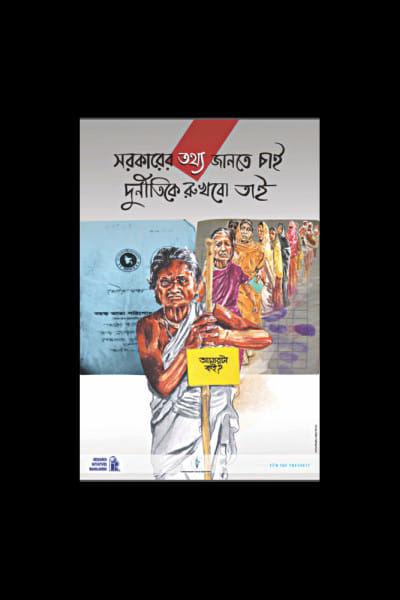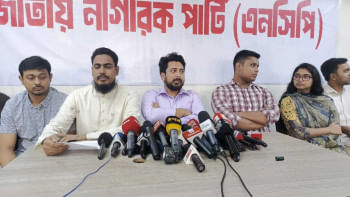Right to Information: Impact of High Court ruling

An important development took place last month regarding the Right to Information (RTI), which is likely to have significant impact on the transparency regime. It concerned a ruling by the High Court Division (HCD) on a decision of the Bangladesh Information Commission (BIC).
The ruling resulted from a writ petition filed by six Bangladeshi citizens who were aggrieved by a decision of BIC on a complaint submitted to it earlier under the RTI Act. The court had two questions before it: one, whether citizens had unfettered access to information held by the Election Commission (EC) on audited annual statements of income and expenditure submitted to it by political parties; and two, whether the desired information was "third party" information which required checking if the parties considered it "secret information" under Section 9(8) of the RTI Act. The petitioners had submitted that the information concerned was public information and thus, required no "third party" clearance. BIC took the opposite view.
After preliminary hearing, HCD issued a Rule Nisi, calling upon BIC to show cause why the said decision should not be declared to have been passed without lawful authority and of no legal effect. The ruling was made absolute on February 18, 2016, which meant the Court found in favour of the petitioners.
Section 9(8) of the RTI Act requires a Designated (Information) Officer of a public authority, dealing with a request for information, to check if the said information "has been supplied by a third party or a third party's interest is involved in it and the third party has considered it as secret information." If so,the DO is required to seek the opinion of the "third party" before acting upon it.
Let us now relate the law to the facts of the case. The six petitioners of the writ are various office-bearers of Shushashoner Jonno Nagorik (SHUJAN), a Bangladeshi NGO which seeks to promote democracy and good governance in the country. A number of them had submitted an RTI application in June 2013 to the Designated Officer (DO) of the EC requesting photocopies of all available audited annual statements of accounts filed by registered political parties with the EC over the years.
In his response, the DO informed the applicants that the information sought were not EC's own information, and should be collected directly from the political parties. Unhappy with this, the applicants preferred an appeal, under Section 24 of the RTI Act, to the Appellate Authority of the EC, which affirmed the decision of the DO.
The applicants then filed a complaint to the BIC under Section 25 of the RTI Act. At its hearing on October 22, 2013, the BIC agreed with the EC position that opinion of the "third-party" was indeed necessary, and asked the applicants to reapply to the EC, specifying names of political parties and the time period for which information was sought. The EC in turn was directed to write to the concerned political parties, seeking their opinion on the request.
Following this and after further back and forth, the applicants were informed by the EC that out of 21 registered political parties, only three, namely Bangladesh Muslim League, Jatiya Somajtantrik Dal (JSD) and Bikalpadhara Bangladesh, had consented to the disclosure of the requested information. The EC was willing to act accordingly.
Being dissatisfied with this response, the applicants submitted a review petition to the BIC stating that its earlier decision laying down a requirement of seeking consent from "third-parties" was incorrect, as the information sought were "public information", which every citizen was entitled to access from the EC under Section 4 of the RTI Act.
BIC responded by saying that as there was no scope for review under the RTI Act, a fresh complaint was necessary. This was submitted, whereby BIC reaffirmed its earlier decision. With all RTI avenues thus exhausted, the complainants filed the writ petition.
RTI enthusiasts, activists and scholars will now have to await the reasons for the court ruling. These will help all concerned, including the BIC, to deal with this and other provisions of the Act that pose problems for interpretations. It may, however, be said in anticipation that a contextual reading of the law by the learned commissioners could perhaps have avoided the need for the writ petition. For, it may be argued that Section 9(8) seeks to safeguard "third party" information only as circumscribed by the objectives of the Act.
It may be noted that secrecy was neither requested by the political parties in their submissions to the EC nor could they have done so. This is because they are required to provide the information under Political Parties Registration Rules, 2008, framed under Article 94 of the Representation of the People Order, 1972. This is patently public information. A positive approach to the application of the law on the part of the EC and the BIC would have shown that the question of secrecy did not arise at all. Moreover, no other provision of the Act had prevented the EC from disclosure of the information.
Two concluding remarks may be pertinent here. The first relates to interpretation of the law. Among many principles of interpretation, one is noscitur a sociis, which in English means "a word is known by the company it keeps". Applying that principle, the word "secret" in Section 9(8) of the RTI Act, read in conjunction withother provisions and intent of the Act, which is to replace secretive governance with transparency and accountability, would call for qualified application. It is useful to recall that there is a growing international practice which favours disclosure over secrecy wherever public interest clearly overrides other interests.
The second remark relates to the status ofpolitical parties under the RTI Act. Do they not qualify as "public authority"? Shouldn't citizens be able to obtain the information on income and expenditure, or any other information on their work, directly from the political parties, without going via the EC? In our view, the answer to both should be "yes". However, they have not arisen in a RTI case in Bangladesh yet. In India, they have and the result was electrifying.
In the Indian case, two years ago, the Central Information Commission (CIC) ruled that political parties do indeed qualify as "public authority". They based their decision on a liberal interpretation of Section 2(h) of the Indian RTI Act 2005 which includes as public authority any "non-government organisation substantially financed directly or indirectly by funds provided by the appropriate Government". In doing so, they considered submissions describing various support/facilities Indian political parties received, directly or indirectly, from the government. The ruling was challenged in the High Court by the political parties, where it remains pending. [See also our column of August 16, 2015 in this newspaper.] The Bangladesh RTI Act 2009, in Section 2(b) includes as public authority: "any private organisation or institution run by government financing or with aid in grant from the government fund". Would BIC find our political parties to qualify as "public authority" under this section, given the various facilities/concessions they receive from the government? We will have to wait for an RTI application to put the matter to test.
The writers are Chairman, Research Initiatives, Bangladesh (RIB) and Project Coordinator (RTI section) of RIB respectively. Email: [email protected].

 For all latest news, follow The Daily Star's Google News channel.
For all latest news, follow The Daily Star's Google News channel. 



Comments